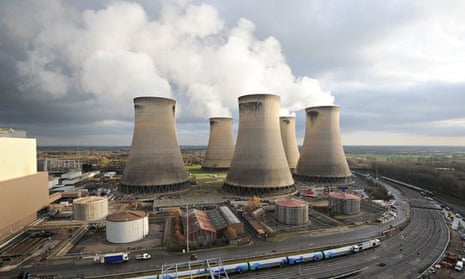The UK's first carbon capture and storage (CCS) plants must be fast-tracked and get the go-ahead within a year, according to a report from MPs. It describes the technology, which traps the carbon dioxide from fossil fuel burning and buries it, as “vital to limit climate change”.
The MPs on the energy and climate change select committee (ECC) sharply criticised the government's botched £1bn competition for the first plants, which launched in 2007 and had to be restarted in 2011, after the last competitor withdrew.
Tim Yeo MP, chair of the ECC, said: “Fitting power stations with CCS is absolutely vital if we are to avoid dangerously destabilising the climate. After nearly a decade of delay, the Department of Energy and Climate Change has finally got near to delivering two pilot CCS projects in the UK. It must now fast-track these projects and reach final investment decisions before the election to ensure this technology can start delivering carbon savings by the 2020s.”
If the pilot projects go ahead they will fit CCS to a gas-fired power station in Peterhead and to the coal-fired power station at Drax in Yorkshire.
Yeo said the pilots would not be enough to kick-start the large CCS industry needed in the UK to cut carbon significantly and that other CCS projects must be made eligible for the guaranteed-price contracts being given to other low-carbon energy projects such as the proposed nuclear power plant at Hinkley Point and offshore wind farms.
Yeo added: “The CCS ‘competition’ the government launched has turned out to be a model example of how not to support a fledgling industry.”
The MPs said CCS was a vital technology because burning all existing fossil fuel reserves without capturing their emissions would drive global warming well above the 2C threshold that scientists describe as dangerous.
The report said the UK was very well placed to become a world leader in CCS because of its access to the North Sea, where CO2 could be buried in exhausted oil and gas fields. The UK's engineering expertise and the cross-party commitment to cutting carbon also helped, it said.
Energy minister Michael Fallon said: “The UK is ahead of the rest of Europe with two CCS projects actively undertaking detailed engineering studies ahead of full construction." He said CCS projects would be supported by long-term guaranteed-price contracts "so it’s important we take the time to get our decisions right and follow a robust process".
But Tom Greatrex MP, Labour’s shadow energy minister, said: “The government attitude towards CCS has been one of damaging neglect. It appears to be uninterested in the enormous potential for CCS in the UK. In our efforts to decarbonise, CCS is not an option but a necessity.”
Professor Stuart Haszeldine, director of the Scottish CCS research group, said: “We all want a secure future, which includes low-carbon energy. Developing five CCS projects now will cost each UK household around £30 per year. The UK needs more than 30 of these to start building before 2025. To avoid extra costs later, we must develop our CO2 storage now. That is a good insurance premium against the 100% certainty of future carbon taxes and future global change.”
Nick Molho, at WWF-UK, said demonstrating the feasibility of CCS is an urgent priority for the government: “But the government shouldn’t plan significant investments in new fossil fuel plants today on the assumption that CCS technology will be available at an affordable cost in the future when we simply don’t know that yet.”

Comments (…)
Sign in or create your Guardian account to join the discussion